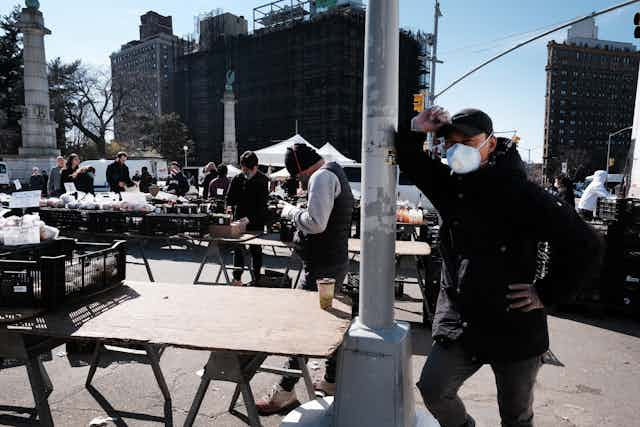The familiar sight of weekend shoppers brushing shoulders at farmers markets across the U.S. is under threat from the coronavirus and fears of its spread.
In Seattle, farmers markets have been suspended altogether. In New York state – the epicenter of the U.S.’s fight against the virus – they remain open, but residents are being warned against gathering in groups and told to practice social distancing.
Such uncertainty is likely to hurt so-called “beginning farmers” – typically smaller-scale, start-up operations. As an expert in diversified farming systems, I can see vulnerable farmers closing down as a result of this crisis, and this could have a knock-on effect on the long-term food supply chain.
Vibrant community
Nearly 30% of U.S. farms are run by farmers who have been in the business for fewer than 10 years. In comparison to the general farming population, beginning farmers are more likely to be women, people of color and military veterans.
They also have an average age of 46 – more than 10 years lower than the general farmer population’s average age of 57.5.
Beginning farmers form a vibrant and diverse part of the U.S. farming community. However, they are also among the most economically vulnerable of farmers. Since they are just starting out, they are often still formulating business plans, balancing farm finances, creating new marketing opportunities and establishing their farms’ viability.
They are also less likely to farm commodity products – crops such as corn, soybeans and wheat. Instead, they tend to focus on diversified fruits and vegetable crops, such as heirloom tomatoes, green beans and blueberries, depending upon the climate and soil conditions.
Farm to table
Beginner farmers also tend to find it harder to access capital investments or federal loan opportunities that would provide support during inclement weather or a pandemic lockdown.
Clearly, this makes the more than 900,000 beginning farmers in the U.S. at risk from potential closures of farmers markets and farm-to-table restaurants due to coronavirus restrictions.
Beginning farmers typically farm on small acres of land, with a diverse array of crops, and sell to nontraditional supply chains, instead of large grocery stores.
Many small-scale beginning farmers have found success in the past decade due to the public’s increased interest in consuming local food. That has made farmers markets and community-supported agriculture important supply outlets. The value of sales of local food and products direct to consumers has more than doubled between 2012 and 2017.
These niche markets have increased engagement between farmers and consumers. The supply chain is based on local farmers modifying what they farm based on local consumer needs. This increased interaction has benefited both parties, but it has also left the system vulnerable to the realities of dealing with the current pandemic.

The coronavirus pandemic puts these smaller businesses at great risk amid uncertainty about whether farmers markets will remain open.
The added challenge for farmers also pertains to their business model. Farms incur nearly all of their costs at the beginning of the growing season when farmers are purchasing seeds, growing seedlings and preparing the land. Without a market in place for these farmers, they will be more at risk of losing their business.
It is also much harder for small-scale farmers to get contracts to sell into large grocery stores, so they will be disproportionately affected by any lengthy shutdown of restaurants or farmers markets.
Growing hope
A hopeful sign is that some places, such as California, have deemed farmers markets essential places where people can go to purchase food.
Farmers markets can be safe places for people to go to pick up local products at a minimum risk if protocols are put in place to increase social distance and reduced handling of products, such as ordering online and then prepackaging the products into one box or bag per customer.
Most small-scale beginning farmers will have few options for marketing without the direct sales of their products to consumers. Without them, farming businesses will decrease, impacting the capability of growers in the U.S. of providing enough food, fiber, and flowers in the future.
There are some glimmers of hope for beginning farmers. By their very nature, they may have had to be creative in identifying new opportunities and innovative in their marketing approach – qualities that might make them innately prepared to adapt to the new conditions, such as moving their business model to online sales. What they need now is for society to ensure that some type of supply chain is in place for them to be able to capture the current demand.
[You’re smart and curious about the world. So are The Conversation’s authors and editors. You can get our highlights each weekend.]

